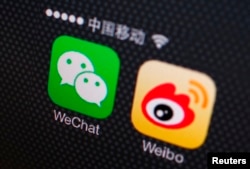China’s latest regulations for online publishers, which took effect last Thursday, have provided authorities with a legal footing and explicit censorship powers to tighten cyber control. They also help cut off loophole advantages, which their print-based counterparts do not enjoy.
But the new rules, analysts warn, are so wide-ranging that any arbitrary implementation will hurt the prospects of emerging industries, worth billions of dollars, while stifling the digital realm’s innovative nature. Official statistics show that, with a population of 54.3 billion users, the entire online gaming industry in China including mobile games, played on hand-held devices, was valued at $21.7 billion last year.
“In typical Chinese fashion, the regulator will have a lot of discretion in terms of how they implement these rules. I think they will end up using it in a fairly arbitrary way,” said Robert Atkinson, president of the Washington D.C.-based Information Technology and Innovation Foundation.
Sweeping clauses
Clauses of the new Administrative Regulation for Online Publishing Services are so “sweeping” that any digital content-related industries will be affected, he added.
Among many, the mobile gaming industry in China will now be under the scrutiny of Chinese censors. The sector has grown rapidly in recent years with an estimated value of $8 billion last year.
“There exists a gray area, where China hasn’t yet requested [operators of] mobile games to secure an approval number prior to their release [on a product-by-product basis.] I think the newly-announced regulation will close the loophole for mobile games,” said Kuo Wen-chi, a gaming expert and an adjunct professor from Lunghwa University of Science and Technology in Taiwan.
But instead of going after individual companies, Chinese authorities may exert pressure on digital distribution platforms such as the Apple App Store or Google Play, the latter of which is reportedly aiming to launch in China this year, as the platforms have final control over what’s been put online, said Allen Zhu, a lawyer specializing in intellectual property rights for the Chinese gaming industry.
Censorship and hacking concerns forced Google to leave China in 2011, and because of that, the country does not have Google play. But that hasn't stopped the market from going. In addition to Apple's App Store, China has more than 200 independent Android app stores alone.
“The App Store has a huge influence in the gaming industry. Certainly, it [China] doesn’t wish that the platform can carry games, which the Chinese government has no control over. I believe the government will definitely impose control,” Zhu said.
“In terms of how to manage [the flow], I think the government will enter talks with the App Store,” he added.
Zhu said that, based on the new rules, the App Store should be required to apply for an operating license, although others argue that the distribution platform, maintained by Apple Inc., doesn’t fall into the category of online publishers.
Instead, it should be categorized as a cross-border operator of audio-video entertainment services, which China has promised not to constrain in accordance with its World Trade Organization commitments.
Meanwhile, social media will also face similar indirect control to manage online speech that is unwelcome by Chinese authorities.
Indirect management
An official from the State Administration of Press, Publication, Radio, Film and Television told state media recently that the new regulations will not cover so-called “we-media” or “self-media” - individuals, groups or companies who post opinions or information online.
Instead, self-media platforms such as Weibo and Wechat will now have to secure an operating license, the official said, without giving his name.
In spite of the official clarification, lawyer Zhu said there still exists room for authorities to extend their control over the self-media.
“I don’t think it can be ruled out that the new rules may further apply to the self-media in the future because the clauses of the new regulations haven’t explicitly excluded self-media,” the lawyer said.
All in all, the lack of clarity in the new rules creates ambiguity for their future enforcement.
Lack of clarity
This has worried many foreign firms, which are fundamentally banned from publishing online content in China without approval. And if they plan to, the delay of such approval will seriously hurt their market shares there.
Operators of virtual reality (VR) systems such as Samsung’s Oculus Rift, which is now owned by Facebook, or Sony PlayStation VR, have reportedly postponed their product launches in China, adopting a wait-and-see attitude as the new regulations may now pose serious barriers to their entry into the Chinese market.
Aside from trade barriers, if the new rules tighten controls too much, online innovation will suffer, which goes against the Chinese government’s efforts to promote innovation, Atkinson said.
“This policy reflects that internal contradiction of the party wanting to maintain control. At the same time, innovation really means letting go of control and letting a thousand flowers bloom,” he said.






